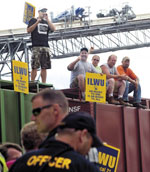
Showdown on West Coast Docks: The Battle of Longview
(November 2011).
click on photo for article
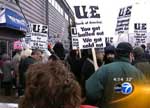
Chicago Plant Occupation Electrifies Labor
(December 2008).
click on photo for article
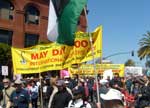
May Day Strike Against the War Shuts Down
U.S. West Coast Ports
(May 2008)
click on photo for article

May 2020
Workers Courageously Fighting in
Coronavirus Hot Spot
Victory to Yakima Packinghouse Strikers!
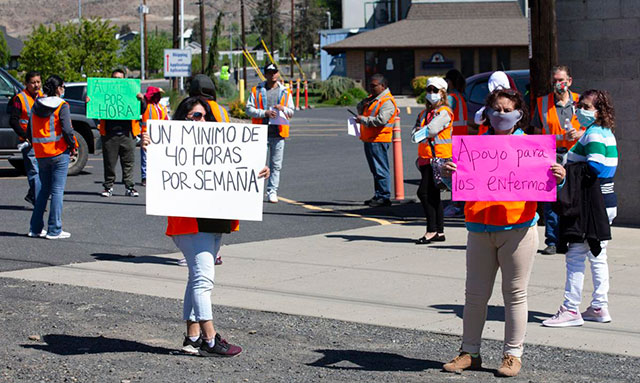
Workers on strike outside the Allan Brothers packinghouse in the Yakima Valley, Washington State, May 8. (Photo: Evan Abell / Yakima Herald-Republic)
The following is the text of an Internationalist Group
leaflet, in English and Spanish, distributed on strike
lines in Yakima.
Amid the deadly coronavirus pandemic, hundreds of workers in Yakima Valley, Washington, are courageously fighting for their livelihoods, and their lives. On Thursday, May 7, dozens of packinghouse workers at Allan Brothers in Naches walked out, picketing both shifts at the 300-worker fruit processing plant. Within days, workers at a half dozen other packinghouses joined the strike movement – including Frosty Packing (“Jack Frost”), Hansen Fruit, Columbia Reach and Roche in Yakima city, and Matson Fruit and Monson Fruit in Selah – protesting and marching from company to company in downtown Yakima and in outlying towns.
By Monday the management at Roche Fruit conceded a $100 per week bonus. But other employers are resisting even this concession, evidently playing for time to wear down the strikers, hoping that economic desperation will force them back to work. Meanwhile, the bosses are no doubt conferring with their union-busting lawyers on the swiftest and most economical way to return to “normal” conditions of profitable exploitation. This will be a hard fight.
The workers, mostly Latina women, are demanding cleaning and disinfectant provisions, “social distancing” safety measures, personal protective equipment like masks and gloves, a minimum of 40 hours work a week and a “hazard pay” bonus to their poverty wages. Most workers that The Internationalist spoke to during several days on the strike lines this week are paid at or near the minimum wage, even after working in the plants for over a decade. R., who has worked in the same packinghouse for almost two decades, expressed their anguish:
“We don’t have safety at work. I have a six-year-old child. I am very worried. What good is it that the children are staying home from school when I can bring the danger? There are more than 200 workers in this plant working back-to-back. And if you have to go to the doctor it costs a lot of money. I can’t afford to stay home so I have to work.”
Yakima County, a relatively isolated rural area in central Washington, has the highest rate of COVID-19 infection in all of Washington, Oregon and California. This is no accident. The same is true of communities across the Midwest and South where meatpacking and poultry plants are located. While the virus is a natural phenomenon, the pandemic and its awful toll are a product of capitalist society, in which workers are treated as raw material for exploitation. Doubly and triply oppressed African American, Latin American, Native American and immigrant communities live in conditions that guarantee infection, with little access to quality medical care.
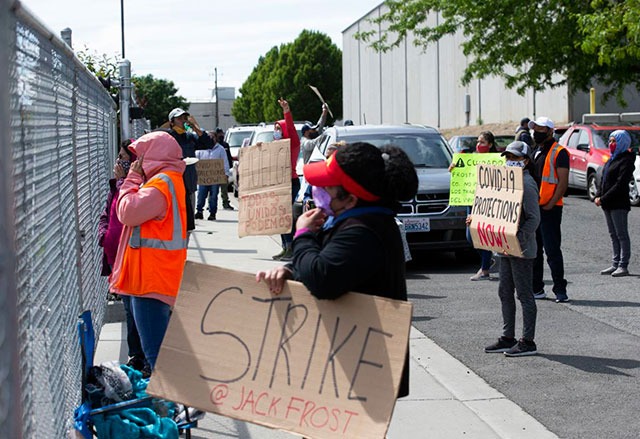
Strikers outside the Frosty packinghouse in Yakima, May 14. (Photo: Evan Abell / Yakima Herald-Republic)
Months after the pandemic hit Washington, Democratic state regulators issued “emergency” rules under which seasonal farm workers who pick hundreds of millions of dollars’ worth of apples, cherries, pears and hops will still be housed in barracks, but they must sleep head to toe! No wonder the virus has rapidly spread through the valley. And immigrant farm workers could be picked up at any moment by the Immigration and Customs Enforcement (I.C.E.) police. The Internationalist Group demands full citizenship rights for all immigrants!
Strikers can see that “we” are not “all in this together.” But now that the battle has been joined, the question is, who will win – the workers or the apple kings? While production at some plants has been slowed, it has not been stopped. Trucks and scabs pass in and out without trouble. The leaders of the union, Familias Unidas por la Justicia, have cautiously avoid any actual picketing, looking instead to the National Labor Relations Board (NLRB). In this capitalist “democracy,” labor laws give workers a supposed right to organize and even, in certain cases, to strike. But not to win.
Almost 25 years ago, the Teamsters and United Farm Workers with great fanfare launched a joint organizing drive in the valley’s farms and packing houses. The bosses were able to neutralize the campaign, knowing that the system of NLRB-regulated unionism could ensnare and wear down any union that stuck to its rules, especially in an industry with a seasonal workforce. Play by the bosses’ rules and you’re bound to lose.
A decade later, a strike for recognition at the Snokist co-op succeeded after eight long months in 2005-06, although little was gained in wages. After layoffs and bankruptcy, Snokist was bought out by Del Monte. The Yakima plant is still union, but most of the valley is non-union, impoverished, and now pressed into “essential” labor that risks workers’ lives.
The Teamsters union that represents Del Monte workers also “organizes” county sheriff’s deputies and prison guards who will be sent to attack any strike that dares to interfere with the supposed “right” of the employers to exploit “their” workers. Class-conscious workers say: cops and prison guards out of the unions!
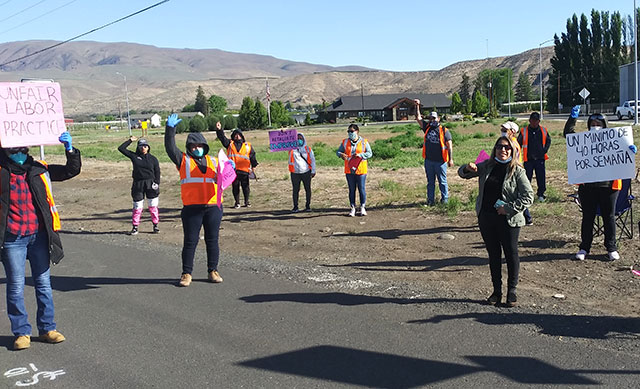
Strikers at Allan Bros. packinghouse in Naches, Washington, May 8. (Internationalist photo)
Now a hunger strike has been launched. We salute the inspiring courage and determination of the hunger strikers. But we have to speak frankly: the packinghouse bosses and orchard owners have demonstrated time and again that they will not be moved by appeals to conscience or morality. They’re out to make hundreds of millions of dollars, which means mercilessly exploiting the workers’ labor. They only understand the language of power.
Strikes must aim to shut the packing houses tight until
the owners cede to the workers and their eminently modest
demands. Key to that is organizing solidarity
– not words, but action. If right-wing protesters can
gather by the thousands in Olympia in defiance of the
governor’s emergency decrees to demand that the most
oppressed and exploited be sacrificed at the altar of the
“free market,” then unions across the state must mobilize
now to build mass picket lines to win the strike,
and make Yakima a stronghold of union power. ■
(en español)
¡Victoria
a la huelga de las empacadoras de Yakima!